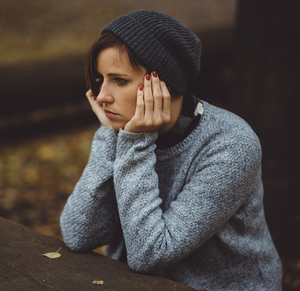Anxiety & Depression

What is Depression?
 Depression is a common disorder, affecting over 350 million people worldwide. It is a disabling condition that adversely affects a person's family, work, or school life; sleeping and eating habits; and general health.
Depression is a common disorder, affecting over 350 million people worldwide. It is a disabling condition that adversely affects a person's family, work, or school life; sleeping and eating habits; and general health.
In the United States, the incidence of depression has increased every year in the past century, and now, according to the Centers for Disease Control, one out of ten people report experiencing a depressive episode.
What is depression like?
Depression is typically characterized by low energy and mood, low self-esteem, and loss of interest or pleasure in normally enjoyable activities. It causes unnecessary suffering and with severe depression can be a risk factor for suicide.
The most commonly diagnosed type of depression is Major Depressive Disorder. Major depression involves either an overwhelming feeling of sadness or a loss of interest and pleasure in most usual activities for at least two weeks, along with some of the other symptoms listed below.
Symptoms of depression
- Sleep disorders (too much or too little)
- Shifts in appetite and weight (too much or too little)
- Irritability, restlessness, or anxiety
- Chronic physical symptoms that do not respond to treatment, including pain, gastrointestinal disturbances, headaches, etc.
- Loss of energy and fatigue
- Learn to increase positivityFeelings of persistent sadness, guilt, hopelessness, or loss of self-worth
- Thinking difficulties, such as memory loss, challenges concentrating or making decisions
- In severe depression, thoughts of death or suicide
More facts about depression

Women are 70% more likely than men to experience depression in their lifetime.
Men and women experience depression differently—while women tend to experience sadness and guilt, men often feel restless or angry and are more likely to turn to alcohol and drugs to cope.

Only 50% of people actively seek conventional treatment for depression, although a majority of people do find some relief through treatment.
Women and adults between the ages of 45 and 64 are most likely to meet the criteria for severe depression; however, over 3% of youth ages 13-18 have also experienced a debilitating depressive episode.
- 1 of 4
- 2 of 4
- 3 of 4
- 4 of 4
Help cope with depression
Try a guided meditation
Sit comfortably with your feet on the floor as you listen to the audio. You may want to close your eyes. If you find your mind wandering, gently bring it back again.
You can download the MP3 file to play in a relaxing environment. You will need to unzip this file once downloaded. Or you can read a PDF transcript of the meditation.

Practice self-compassion
In this 2-minute video, self-compassion researcher Kristin Neff offers tips for making friends with yourself.

4 ways to deal with difficult emotions
Difficult experiences can actually be a catalyst for growth, if you handle your emotions in a healthy way.
Rather than getting caught up in the suffering (“I can’t stop going over what I did wrong”) or trying to mask the feelings (“I just try to push it out of my mind”), a responsible and productive way to deal with negative emotions is to accept them as a natural human response to pain.
When you find yourself struggling with a difficult emotion, try one of these strategies:
- Drop the thoughts you are telling yourself about the situation and turn your awareness toward your body. What does this emotion feel like in your forehead, chest, gut, or legs? You don’t have to change any of the sensations; simply notice the energy of the emotion in your body. If you find yourself getting caught up in a sensation (“I don’t like the way this feels!”), take a few deep breaths before turning your attention, in a nonjudgmental way, back to the body. Try to maintain a feeling of gentleness and kindness toward yourself.
- Write out your feelings in a journal or notebook. Expressive writing has been scientifically shown to benefit trauma survivors, helping them to make sense of and accept their experiences. Putting emotions on the page can also trigger insight or a path of analysis that may not have manifested internally.
- Share your experience with a trusted friend. If writing doesn’t appeal to you, talking through your feelings with someone else can provide another opportunity to express yourself honestly and openly. The buffer of social support also increases feelings of confidence and trust, which help offset negativity.
- Think about the suffering of others. Painful emotions like fear, grief, or anger all have a claustrophobic effect—they can make you feel as if your suffering is unique to you. This feeling of alienation only intensifies the pain. But by contemplating the fact that whatever it is you’re feeling right now has been felt by millions of others at some point in their lives, you give yourself a break from the isolation of your own experience. Reflecting upon shared suffering also boosts your compassion, which has been proven to produce greater positivity and more meaningful connections with others.
Note: None of these strategies is designed to make the painful emotion disappear. These are simply tips for dealing with negativity in a productive way.
DISCLAIMER: The information in this website page is not to be used in place of medical treatment by a health or mental health provider.
An estimated 1 in 10 U.S. adults report depression. (2012). Centers for Disease Control. Retrieved April 3, 2014 from http://www.cdc.gov/features/dsdepression/.
Any anxiety disorder among adults. National Institute of Mental Health. Retrieved April 3, 2014 from http://www.nimh.nih.gov/statistics/1anyanx_adult.shtml.
Depression. (2011). National Institute of Mental Health. Retrieved April 3, 2014 from http://www.nimh.nih.gov/health/publications/depression/index.shtml#pub1.
Depression fact sheet. (2012). World Health Organization. Retrieved April 3, 2014 from http://www.who.int/mediacentre/factsheets/fs369/en/.
Facts & statistics. (2014). Anxiety and Depression Association of America. Retrieved April 2, 2014 from http://www.adaa.org/about-adaa/press-room/facts-statistics.
Major depressive disorder among adults. National Institute of Mental Health. Retrieved April 3, 2014 from http://www.nimh.nih.gov/statistics/1mdd_adult.shtml.
Websites
Institute of Functional Medicine http://www.functionalmedicine.org/
National Center for Complimentary and Alternative Medicine - Naturopathyhttp://nccam.nih.gov/health/naturopathy/
Holistic On-line - Depression http://www.holisticonline.com/remedies/Depression/dep_home.htm
Depression handouts for patients from the University of Wisconsin http://www.fammed.wisc.edu/integrative/modules/depression


